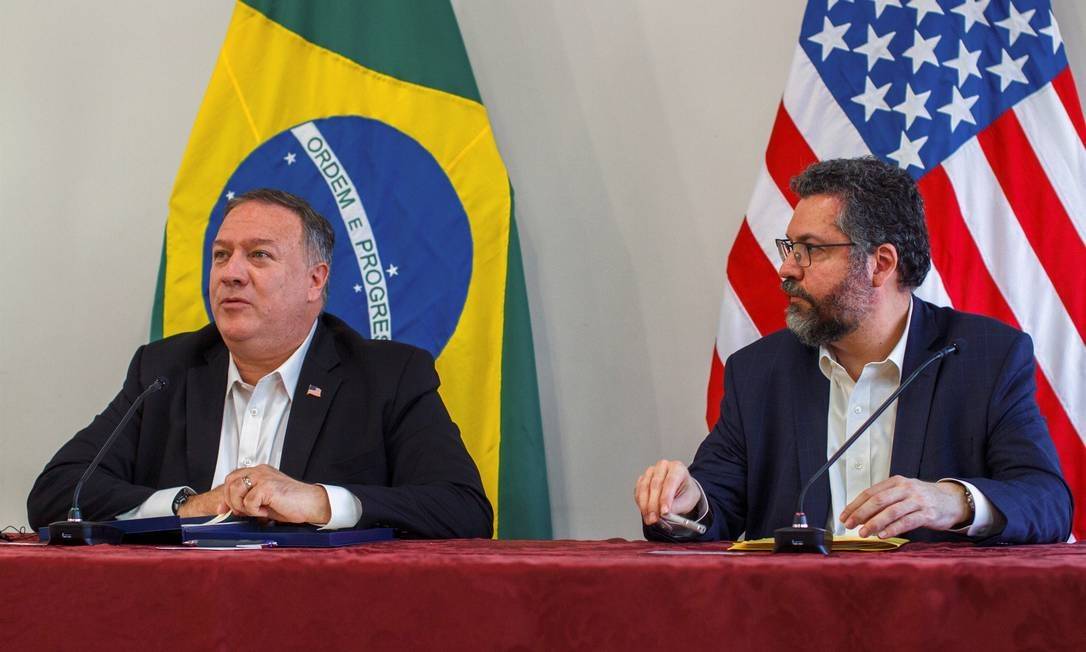RIO DE JANEIRO, BRAZIL – During US Secretary of State Mike Pompeo‘s trip to four South American countries, Venezuela was the main topic of discussion.
Although the fight against drugs and economic cooperation were also discussed, Pompeo and his counterparts left no doubt that Venezuela’s neighbors Colombia, Brazil, Suriname, and Guyana, all of which he visited, would play an important role in the US government’s efforts to overthrow President Nicolás Maduro.
Colombia clearly sees the US government as playing a leading role in this process. Its unconditional support for the opposition politician Juan Guaidó in his role as self-proclaimed interim president and “the will for a transition to democracy without the malicious influence of Cuba, Russia or Iran” would be “highly valued” in the US and would make Colombia the “true leader in the region,” Secretary Pompeo said.

Pompeo is also said to have spoken with Duque about the extremely slow progress in implementing the peace treaty and the ongoing violence. However, both see the ELN guerrillas and the former Farc-EP dissidents as the main culprits.
Both dissidents are allegedly supported by the “Maduro regime”. The fact that paramilitary groups are on the rise and that last week the UN also called on the Duque government to investigate the deaths and injuries caused by police forces during protests in Bogotá appeared to be irrelevant.
Both countries signed the so-called “Colombia Crece” (Colombia is growing) plan in August to jointly address “rural development, infrastructure expansion, security and the rule of law” issues. Furthermore, President Duque recently approved the reactivation of the US Special Security Force Assistance Brigade in Colombia.
In Colombia, as in the preceding discussions in Guyana, the fight against drugs was also on the agenda. Here too, a causal link was established between Venezuela and Maduro: They “knew” that he was “an accused drug trafficker”. This implied that “he must go”. However, Pompeo once again failed to provide evidence for this assertion.
For his part, Maduro declared on Pompeo’s trip that he was “harassing the region”. He had called for a “war against Venezuela” but had failed.
Cuba’s President Miguel Díaz-Canel said on Twitter that it was “a tour designed to join lies with liars, untruths, slander, and minions of the empire, working together to create chaos, instability and even the climate for foreign military intervention against Venezuela.”
When he visited Brazil on Friday, Pompeo pledged a further increase of US$348 million (R$1.74 billion) in financial assistance for Venezuelan migrants. Since 2017, the USA has allocated around US$1.2 billion to this end, Pompeo said. In the city of Boa Vista, on Brazil’s border with Venezuela, the US Secretary of State met with Venezuelan refugees and his Brazilian counterpart, Ernesto Araújo.
In Guyana, Pompeo signed an agreement under which joint military surveillance and reconnaissance missions will be conducted by ships, and with the approval of the Guyanese government, also on its territory, as of Monday.
US company Exxon Mobil secured exploration rights to recent giant oil and gas discoveries, and now the joint military patrols will provide Guyana with “more sovereignty to better understand and control its own economy,” Pompeo said after talks with Guyana’s new president Mohamed Irfaan Ali.
Furthermore, an agreement was reached on improving private sector investment in Guyana’s infrastructure, energy sector, and digitalization.
In talks with the new head of state in Suriname, Chan Santokhi, Pompeo also strongly recommended cooperation with US companies. No state company could “guarantee the quality of products and services like US private companies.”
In parallel, he cautioned against expanding trade with China, the USA’s major competitor in the region. This, he said, would seem like “a great idea” at first, but then “the political costs would soon emerge.”

